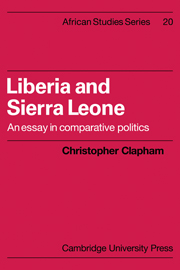Book contents
- Frontmatter
- Contents
- List of maps, tables and figures
- Preface
- Map A Liberia and Sierra Leone in West Africa
- 1 Political Comparison
- 2 Historical Summary
- 3 Resources
- 4 Rules
- 5 Political Allocation at the Centre
- 6 Centre and Periphery
- 7 Aspects of Political Economy
- 8 Concluding Review
- Statistical Appendix
- Bibliographical Note
- Notes
- Index
5 - Political Allocation at the Centre
Published online by Cambridge University Press: 15 January 2010
- Frontmatter
- Contents
- List of maps, tables and figures
- Preface
- Map A Liberia and Sierra Leone in West Africa
- 1 Political Comparison
- 2 Historical Summary
- 3 Resources
- 4 Rules
- 5 Political Allocation at the Centre
- 6 Centre and Periphery
- 7 Aspects of Political Economy
- 8 Concluding Review
- Statistical Appendix
- Bibliographical Note
- Notes
- Index
Summary
THE STRUCTURE OF CENTRAL POLITICS
The rules and resources outlined in the last two chapters combine to form central political bargaining points which differ appreciably. One especially important consequence is that the centre itself has a rather different role and meaning within the overall political structures of the two countries. For both, it constitutes a collection of coercive and economic controls and institutions whose main features have already been outlined. In Liberia, it also serves as an autonomous focus for political identity and support – and also, potentially, for opposition. In Sierra Leone, where the central government can largely be equated with those politicians who are for the time being in power, this feature is conspicuously lacking. The results of this difference appear in all of the four aspects of central politics with which this essay is concerned; the ways in which politicians are recruited to office; the ways in which they combine and compete with one another within the central political arena; the opportunities and strategies for leadership which are open to them; and the role of force, either in support of the government or against it. These aspects of politics in turn affect the relationships between the institutions of central government noted in the last chapter.
POLITICAL RECRUITMENT
Political leaders in both countries have needed to be able to draw on some set of resources which distinguished them from the mass of the population, and in this sense enabled them to become members of an elite. They have needed, too, to make use of patronage and the opportunities which the political structures of the time provided.
- Type
- Chapter
- Information
- Liberia and Sierra LeoneAn Essay in Comparative Politics, pp. 46 - 70Publisher: Cambridge University PressPrint publication year: 1976

